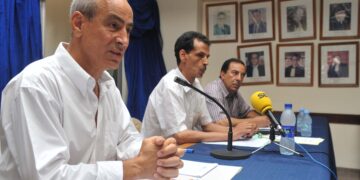Government Should Eliminate Cybercrimes Law Provisions Punishing Free Expression and Allowing "Private Complaints" to Trigger Criminal Prosecution
(Washington, D.C., March 15, 2022)– On Monday, March 14, Judge Ismat Rahamneh in Amman Penal Magistrate Court officially dismissed the criminal complaint against Taghreed Risheq, the Arabic Media Manager of DAWN (www.dawnmena.org), after Ahmad Salameh withdrew his public complaint against her for her tweet criticizing Salameh for mocking former journalist and human rights activist Jamal Khashoggi.
On March 13, the Court also rescinded the travel ban it had imposed against her. Jordanian security authorities had detained Risheq, a dual U.S. and Jordanian citizen, upon her arrival on March 7 at Amman's Queen Alia International Airport and required her representatives to bail her out before releasing her.
"Risheq's prosecution is part of a disturbing pattern in which the Jordanian government has deployed its judiciary to prosecute activists and journalists using the mask of 'private citizen complaints'," said Sarah Leah Whitson, DAWN Executive Director. "The government claims it had nothing to do with the case against her, but the reality is it had everything to do with using its security forces to detain her and empowering a private citizen to exploit its Cybercrimes Law as a tool of censorship."
On January 13, 2022, Risheq tweeted and criticized an article in Ammon News by Ahmad Salameh, in which he mocked Jamal Khashoggi. Almost two months later, on March 7, 2022, Jordanian security forces detained Risheq upon her arrival at the Queen Alia International Airport in Amman based on a criminal complaint they said he had filed against her for the tweet. This was the first time Risheq heard of the criminal proceeding against her.
Deputy Head of the Jordanian Journalists Syndicate, Jamal Shtaiwi bailed Risheq out eleven hours after her detention at the airport. A police officer at the airport informed Risheq before her release that she had to appear at Zahran Police Station In Amman within 72 hours. Forty-eight hours later, on March 9, Risheq went to the police station with her lawyer. A police officer took her statement then instructed her to go straight to the Amman Penal Magistrate Court. A police officer accompanied Risheq and her lawyer to the court.
"It's good to hear that the Jordanian government won't detain people at the airport for private Cybercrime complaints, but it really needs to amend this abusive law to end these 'private complaints' and eliminate provisions that criminalize free expression."
- Sarah Leah Whitson, DAWN's Executive Director
The previous day, on March 8, Jordanian security authorities at the airport also detained renowned Jordanian journalist Daoud Kuttab, also citing a private complaint against him under article 11 of the Cybercrimes Law based on an article he wrote in 2019, releasing him an hour-and-a-half later.
Both Risheq's and Kuttab's detentions occurred just days after DAWN issued a press release on March 4 criticizing the Jordanian government for weaponizing its judiciary to arrest, detain and bring criminal charges against 11 Jordanian Hirak reform activists using the Cybercrimes Law.
At the March 9 court hearing, Judge Rahamneh informed Risheq that the court was criminally investigating her under Article 11 of the Cybercrimes Law, which allows any private individual to initiate a government criminal investigation against any other individual based on a social media post, an article, or any other publication. Ms. Risheq also learned that Salameh had filed his complaint on February 1, and that the court, without ever notifying her, had already held two hearings on her case, on February 27 and March 7, the same day Jordanian security forces detained her at the airport.
"The notion that you can be investigated, tried and detained without ever being informed of the criminal proceedings against you, as Jordan did to Rishek, is a fundamental violation of human rights law, including the right to be informed of the charges against you," said Michael Eisner, DAWN's General Counsel. "The Cybercrimes Law provision allowing any individual to bring a criminal lawsuit against any other individual based on what she has said or published represents a grave threat to the rights of freedom of speech and press, rights guaranteed in the Jordanian constitution and international law."
At the March 9 hearing, Judge Rahamneh also informed Risheq that though he had the discretion to jail her immediately, he would simply impose a travel ban on her instead, preventing her from leaving the country. He scheduled the next hearing of the case for March 20.
"Whether or not Jordanian government officials encouraged Salameh to file his complaint against Risheq, it's very clear that the Jordanian government is using its judiciary and its police to enforce a criminal censorship law to intimidate and silence journalists and activists," said Raed Jarrar, DAWN's Advocacy Director. "We need no better proof of how the government is abusing its Cybercrime Law than the arrests of Risheq and Kuttab."
Before and after the March 9th court hearing, DAWN contacted U.S. senior government officials at the State Department and in Congress, who communicated to their Jordanian counterparts their concern about Ms. Risheq's case.
"DAWN is grateful to the senior U.S. officials who put the Jordanian government on notice that they were monitoring Risheq's case closely, and particularly to Congresswoman Betty McCollum, who sent a letter to the Jordanian Ambassador to the United States," Jarrar said.
On March 9, the Minister for Media Affairs Faisal al-Shbool announced that the government would no longer detain people at the airport based on the Cybercrimes Law.
"It's good to hear that the Jordanian government won't detain people at the airport for private Cybercrime complaints, but it really needs to amend this abusive law to end these 'private complaints' and eliminate provisions that criminalize free expression," said Whitson. "And while we are pleased that the Jordanian government has released our colleague, dismissed the case against her, and lifted her travel ban, we expect compensation for the harm it has caused her, and our organization, deeply traumatizing Risheq and her family, and diverting our organization's time and resources to fight this arbitrary prosecution."







































